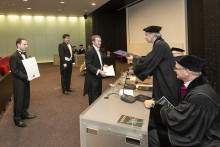Since 2017, the Rector Magnificus of our university imparts the following words to young doctors immediately after they have received their degree certificates:
‘Dear learned doctor [….….] Let me congratulate you also on behalf of the university with your acquired dignity. From now on you have the right to use the title of doctor. This title implies that society can rely on the quality of your judgement, that you will act with integrity and transparency, and that you will communicate independently about the results and the social relevance of your work. Value the doctoralis as an honourable distinction and a well-deserved prerogative, but always remember the obligations imposed by it, towards the scientific community and society.’
This formula refers to a right, namely the right to use the title. The way the duties are phrased conveys both expectation and confidence.
But what is the extent of these duties? They concern ‘your work’. This can be interpreted as: the scientific work that has been done or is still being done. But it is worded in an even broader manner. Suppose that someone who got their PhD at the University of Twente blatantly betrays the aforementioned trust at a later point in time. Someone who, for example, dismisses the results of sound science as mere fables. Or who denies or trivialises the dangers looming over us. Or who spouts all kinds of improbable theories about an invisible hand controlling societal developments in order to destroy us and control the world. Or who denies the good faith of anyone in a position of responsibility who somewhat tries to steer this complex society in the right direction. This is not someone who wants to cause a stir at birthday parties or suffers from delusions. No, this person wants to gain influence over the country’s government, in a destructive way if need be.
This is all just hypothetical, and the chances of someone actually possessing all of these characteristics are, of course, extremely small. But still, what should the University of Twente do about someone who deliberately commits such grave misconduct, making a huge impact on society? All evidence points to the fact that this person is acting in violation of the duties attached to being a doctor. Shouldn’t the university strip them of their title? That would be a fantastic statement, of course. The problem is that the young doctor doesn’t make any pledge or oath, but just listens to what the rector says, possibly already thinking about the upcoming party. Furthermore, the doctoral degree was granted on the basis of achievements that have already been accomplished. Subsequent waywardness doesn’t change that. And it is likely that this person would only benefit from losing their title.
So wouldn’t it be better to turn it into an oath or pledge? But this raises the question of who will assess whether that pledge is kept, and what the standards are. You’ll quickly find yourself on dangerous ground. The only thing the university can do is urge the young doctor to take its wise counsel to heart. And if it’s glaringly obvious that things are going wrong, the university can (should?) speak out about it publicly. Only to wonder afterwards when the first signs of waywardness started to show.
Wiendelt Steenbergen
Professor of Biomedical Photonic Imaging






